By Yuko Ishida | Coordinator
Since the passing of the emergency relief period, survivors of Cyclone Idai were left only two choices: migrate to a bare resettlement land far away from their farming fields, without sufficient resources or infrastructure; or to return to their own damaged homes to restart their lives with almost no help.
Six months after the March 2019 cyclone, as many as 25% of the people in affected provinces, including Sofala, did not have access to safe water. In Sofala Province, more than 47,000 people were displaced due to the cyclone, and many of them found themselves moving to resettlement areas.
Peace Winds Japan (PWJ) and its partner organizations have built water supply systems that include tube wells, solar panels, electric pumps, water tanks, and tap stands at multiple locations. These water supply systems were constructed in three resettlement areas, one host community, and district hospitals in Nhamatanda and Dondo Districts, Sofala Province. One water supply system delivers more than 16,000 liters per day, which can support more than 1,000 people’s daily needs.
In addition to solar systems, PWJ also provided traditional hand pumps and supports affected people who decided to remain or return to their old homes. Sodium was found in the groundwater of some areas and so PWJ, in cooperation with neighborhood residents, repaired old, damaged wells and newly built wells to obtain potable water from limited groundwater sources.
To advance the sustainability of the wells and supply systems, PWJ helped to establish a water management committee to oversee the maintenance of facilities and promote hygiene education among beneficiaries. Thus far, representatives from 1,177 families have participated in the hygiene promotion activities, taking covid-19 preventive measures into account.
As of May 2020, 12% of the people in affected areas continue to rely on open wells, lagoons, waterways, and other unsafe water sources. In response, PWJ is planning a new project with a partner organization, Youth Association for Epidemic Prevention and Combat (AJUPCE), to provide safe water to 1,160 families (5,800 individuals) by May 2021.
By Yuko Ishida | Coordinator
By Yuko Ishida | Coordinator
Project reports on GlobalGiving are posted directly to globalgiving.org by Project Leaders as they are completed, generally every 3-4 months. To protect the integrity of these documents, GlobalGiving does not alter them; therefore you may find some language or formatting issues.
If you donate to this project or have donated to this project, you can receive an email when this project posts a report. You can also subscribe for reports without donating.
Support this important cause by creating a personalized fundraising page.
Start a Fundraiser

